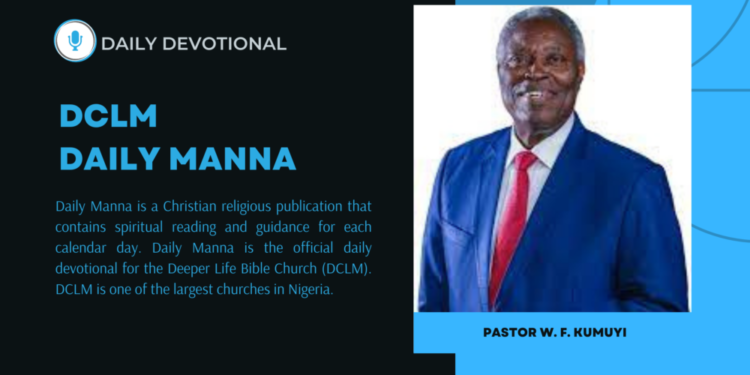DCLM Daily Manna 2025: DCLM Daily Manna 25 June 2025: Divine Sovereignty
Text: Romans 9:19-26 (KJV)
You will say to me then, “Why does He still find fault? For who has resisted His will?” 20 But indeed, O man, who are you to reply against God? Will the thing formed say to him who formed it, “Why have you made me like this?” 21 Does not the potter have power over the clay, from the same lump to make one vessel for honor and another for dishonor?
22 What if God, wanting to show His wrath and to make His power known, endured with much longsuffering the vessels of wrath prepared for destruction, 23 and that He might make known the riches of His glory on the vessels of mercy, which He had prepared beforehand for glory, 24 even us whom He called, not of the Jews only, but also of the Gentiles?
25 As He says also in Hosea:
“I will call them My people, who were not My people,
And her beloved, who was not beloved.”
26 “And it shall come to pass in the place where it was said to them,
‘You are not My people,’
There they shall be called sons of the living God.”
KEY VERSE: (Romans 9:22) What if God, willing to shew his wrath, and to make his power known, endured with much longsuffering the vessels of wrath fitted to destruction.
In his book, A Biblical View of Civil Government, Robert Culver emphasizes God’s sovereignty over all human authority, stating that democratic theory is as unscriptural as a divine right monarchy. He argues that all forms of rulership, whether attained through dynastic descent, family connections, material resources, or democratic election, ultimately derive power from God. Culver asserts that civil government is merely an instrument, not an end in itself, with citizens and their belongings ultimately belonging to God, not the state. God has never granted the state rights of eminent domain.
In today’s passage, Apostle Paul asserts that God, as the sovereign Creator, can shape human destinies according to His will. Humans, being limited and created beings, are not in a position to question God’s decisions or purposes. This serves as a reminder of the vast gulf between divine and human understanding, “For as the heavens are higher than the earth, so are my ways higher than your ways, and my thoughts than your thoughts” (Isaiah 55:9).
God’s interactions with humanity involve both wrath and mercy, displaying the depth of His character. His patience with those who rebel against Him displays His power and justice, while His mercy towards the obedient highlights His glory and grace. This complexity underscores the intricacies of God’s redemptive plan. In the story of the Pharaoh of Egypt and King Nebuchadnezzar of Babylon, we see how God’s mercy endures until their iniquity reaches its limit. Additionally, God’s plan extends beyond the Jewish people to include Gentiles, as foretold in Scripture. This inclusivity, as shown through references to Hosea and Paul’s teachings, reveals God’s sovereign plan to unite diverse people in faith.
Believers are, thus, encouraged to trust in God’s sovereign plan, even when it is beyond their understanding. This trust involves accepting God’s authority and purposes without challenging His decisions. Recognising themselves as objects of God’s mercy should lead believers to a profound sense of gratitude and humility. Understanding that their inclusion in God’s family is an act of divine mercy, not personal merit, fosters a deeper appreciation of God’s grace. This should encourage a spirit of unity and acceptance within the Christian community.
THOUGHT FOR THE DAY: God does not only rule over all things, He overrules our imperfections.
THE BIBLE IN ONE YEAR: 1 Kings 11-12
Daily Manna 25 June 2025

















Comments 1